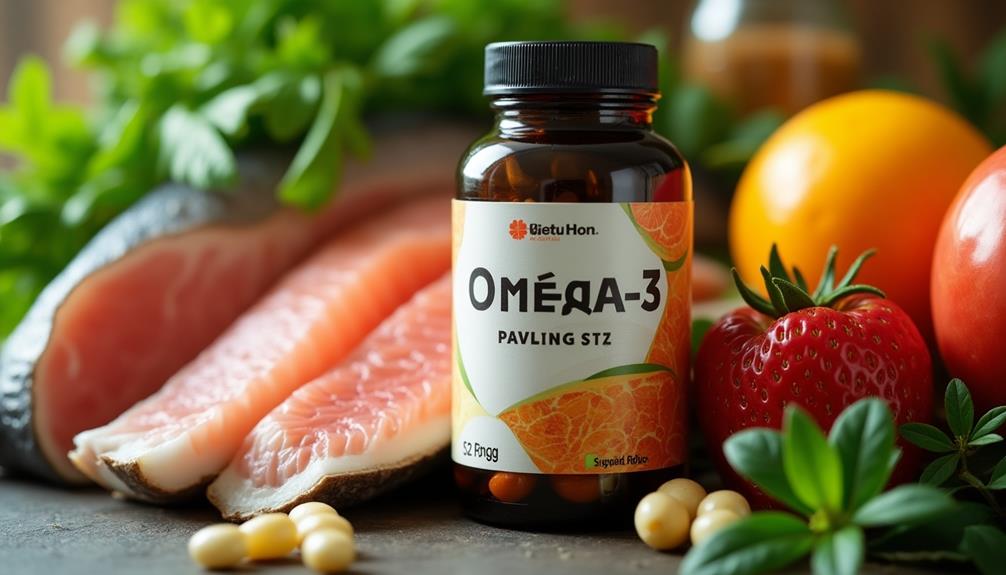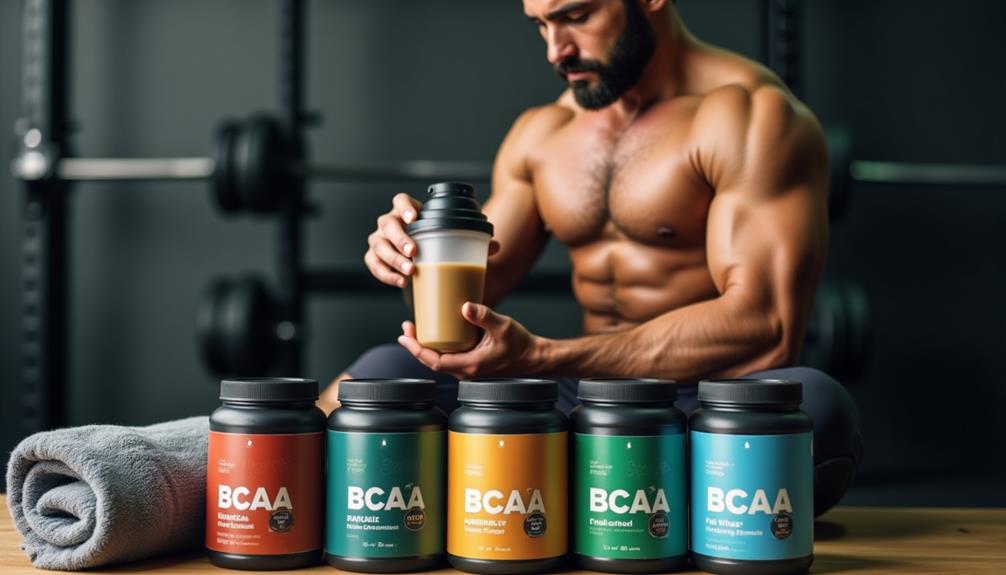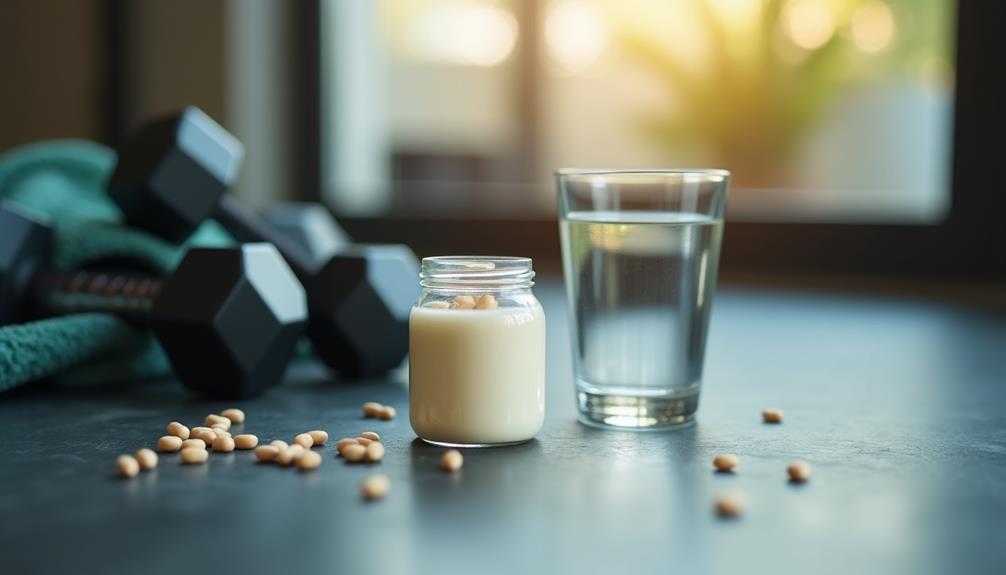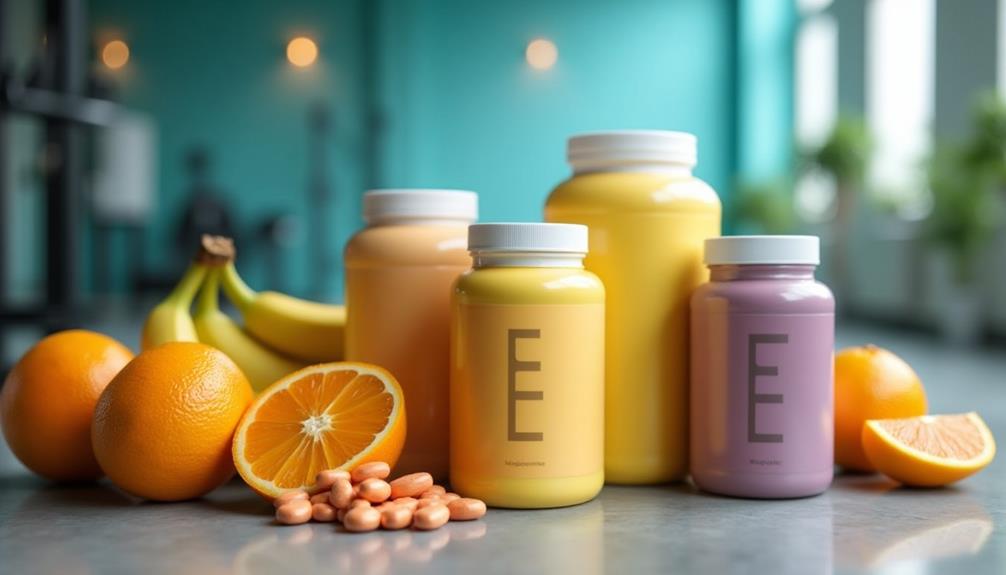To ease muscle soreness fast, consider using key supplements. Start with Omega-3 fatty acids, which help reduce inflammation. Branched-Chain Amino Acids (BCAAs) promote muscle recovery and protein synthesis. Curcumin, derived from turmeric, acts as a natural anti-inflammatory. Glutamine replenishes amino acid levels essential for repairing muscle tissue. Don't overlook magnesium, which relaxes muscles and improves function. Additionally, Tart Cherry Juice may reduce soreness and Vitamin D supports muscle health. Electrolyte supplements can aid hydration and cramp prevention. Together, these can speed up your recovery. There's much more to explore about each of these effective options.
Core Insights
- Omega-3 fatty acids, found in fish oil and flaxseeds, reduce inflammation and muscle soreness effectively.
- Branched-chain amino acids (leucine, isoleucine, valine) promote protein synthesis and reduce muscle damage for quicker recovery.
- Curcumin, combined with black pepper extract, acts as a powerful anti-inflammatory to ease post-workout muscle soreness.
- Magnesium supports muscle relaxation and recovery while enhancing sleep quality, aiding overall muscle function.
- Tart cherry juice, especially the 100% pure variety, lowers muscle soreness levels and improves recovery times.
Omega-3 Fatty Acids

Omega-3 fatty acids, often hailed as the powerhouse of nutrition, play an essential role in reducing muscle soreness after intense workouts. These fatty acids, primarily found in fish oil and flaxseeds, help decrease inflammation in your muscles. When you exercise, tiny tears occur in muscle fibers, leading to soreness. Omega-3s can aid in healing these tears more rapidly, allowing you to bounce back quicker. Much like how coconut water brands are known for their hydration properties, omega-3s are renowned for their anti-inflammatory effects, which can notably reduce post-workout discomfort.
Incorporating omega-3s into your diet is simple. You can consume fatty fish like salmon or take fish oil supplements. Aim for a balanced intake, as moderation is key. By making omega-3s a regular part of your nutrition, you'll support muscle recovery and overall joint health, enhancing your workout experience and performance over time.
Branched-Chain Amino Acids

After exploring the benefits of omega-3 fatty acids, it's important to ponder another powerful supplement: branched-chain amino acids (BCAAs). These essential nutrients consist of three amino acids: leucine, isoleucine, and valine. They play a vital role in muscle recovery and reducing soreness after intense workouts. High-quality supplements often feature a 2:1:1 ratio of these amino acids, which has been shown to be particularly effective for muscle recovery.
When you exercise, your body breaks down muscle protein, leading to soreness. BCAAs help mitigate this by promoting protein synthesis and reducing muscle damage. You can take BCAAs before, during, or after workouts to enhance recovery.
Incorporating BCAAs into your routine may lead to faster recovery times and less discomfort. Whether you prefer powders or capsules, these supplements can be an easy addition to your diet, helping you bounce back faster from tough training sessions.
Curcumin

Curcumin, the active compound found in turmeric, is gaining attention for its potential to ease muscle soreness and support recovery. This natural anti-inflammatory agent works by reducing inflammation in your muscles after intense workouts. When you take curcumin, it can help decrease pain and improve your overall recovery time. Similar to how essential oils promote relaxation, curcumin can aid in muscle recovery and overall well-being.
It's important to note that curcumin is best absorbed when combined with black pepper extract, which enhances its bioavailability. You can find curcumin supplements in various forms, including capsules and powders.
Incorporating curcumin into your routine might just be the boost you need for faster recovery. Always consult a healthcare professional before adding new supplements, especially if you're on medication or have underlying health conditions.
Glutamine

While curcumin offers anti-inflammatory benefits, another supplement worth considering for muscle recovery is glutamine. This amino acid plays an essential role in muscle repair and recovery. After intense workouts, your body's glutamine levels can drop, leading to increased muscle soreness and longer recovery times.
Supplementing with glutamine helps replenish these levels and supports muscle tissue repair. It may also boost your immune system, which can be compromised after intense training.
You can find glutamine in various forms, including powders and capsules, making it convenient to incorporate into your routine. For best results, consider taking it post-workout to maximize its benefits. Overall, glutamine can be a valuable addition to your supplement arsenal for easing muscle soreness.
Magnesium

Incorporating magnesium into your supplement routine can greatly enhance muscle recovery and reduce soreness. This essential mineral plays a pivotal role in muscle function, helping to relax your muscles and prevent cramps. When you engage in intense workouts, your body's magnesium levels can drop, leading to increased muscle fatigue and discomfort.
Supplementing with magnesium can help replenish these levels, promoting faster recovery. It also aids in protein synthesis, which is essential for muscle repair. You can find magnesium in various forms, such as magnesium citrate or glycinate, each offering unique absorption benefits.
To effectively incorporate magnesium, consider taking it before bed, as it may also improve your sleep quality. Overall, magnesium is a simple yet potent addition to your recovery plan.
Tart Cherry Juice

Drinking tart cherry juice before and after workouts can notably lower muscle soreness levels. Studies show that it may help you recover faster and even enhance your overall exercise performance.
When selecting tart cherry juice, look for 100% pure juice without added sugars or preservatives. You can consume it straight or mix it into smoothies. If you're seeking a natural way to support your recovery, tart cherry juice might be an excellent addition to your routine.
Vitamin D

Vitamin D plays a significant role in muscle recovery and overall health. It helps regulate calcium and phosphorus, essential for maintaining strong bones and muscle function. When you get enough vitamin D, you might notice quicker recovery after workouts, reducing soreness and improving performance.
You can obtain vitamin D through sunlight, certain foods, and supplements. If you're not getting enough from these sources, consider adding a supplement to your routine. Aim for a daily intake that aligns with your specific needs, which can vary based on factors like age, activity level, and geographic location.
Incorporating vitamin D into your regimen could lead to better muscle recovery and overall well-being, so pay attention to your levels and adjust accordingly.
Electrolyte Supplements

- Sodium: Essential for fluid balance and helps prevent muscle cramps.
- Potassium: Supports muscle contractions and nerve function, reducing soreness.
- Magnesium: Aids in muscle relaxation and recovery, helping to ease tightness.
- Calcium: Important for muscle contractions and overall bone health.
Frequently Asked Questions
How Long Does It Take for Supplements to Relieve Muscle Soreness?
Imagine feeling tight muscles after an intense workout. When you take supplements, you might notice relief within a few hours, but it can take a couple of days for maximum benefits to kick in.
Can I Combine Different Supplements for Better Results?
Yes, you can combine different supplements for better outcomes. Just make sure they're compatible and consult a healthcare professional. Mixing supplements might enhance effectiveness, but it's important to avoid potential negative interactions or side effects.
Are There Any Side Effects of These Supplements?
Taking supplements can feel like walking a tightrope; side effects vary. You might experience digestive issues, headaches, or allergic reactions. It's important to consult a healthcare professional before combining supplements to minimize risks and maximize benefits.
Should I Take Supplements Before or After Exercising?
You should consider taking supplements after exercising, as they can help with recovery. However, some may benefit from pre-workout supplements for energy. Experiment to see what works best for your body and exercise routine.
How Do I Know Which Supplement Is Right for Me?
Choosing the right supplement's like picking the perfect ice cream flavor—you think you know, but it's tricky! Trust your body's signals, research ingredients, and consider your goals to find what truly suits you.

